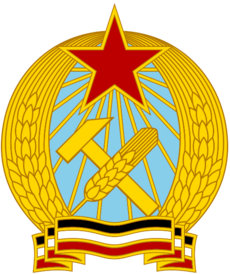Supreme Commissariat of State of Liothidia
Supreme Commissariat of State Oberstes Kommissariat des Staates | |
|---|---|
 | |
| Leadership | |
Status | Collective-leadership executive of Liothidia, Socialist Workers' Party |
Elected by | |
| Seats | 7 members |
| Meeting place | |
| Egon Krauss Hall, Staatsbezirk Rahden, Liothidia | |
The Supreme Commissariat of State is the seven-member executive council that constitutes the central government of the Liothidian Democratic People's Republic and serves as the collective head of state and of government of Liothidia.
While the entire council is responsible for leading the central administration of Liothidia, each State Commissar heads one of the national ministries, agencies or bodies. The position of First Secretary rotates among the seven Commissars on a yearly basis, with one year's Vice Secretary becoming the next year's First Secretary. Georg von Carstein is the incumbent First Secretary since 1 January 2019.
History
Great Revolutionary War Commissariat
1968 Reforms
Operation of the Commissariat
First Secretary
Commissariat meetings
Decisions and responsibilities
Each State Commissar heads a government department, much like the ministers in the governments of other countries. Colloquially and by the press, they are often referred to as ministers, e.g. the head of the People's Ministry of National Defence as "people's minister of defence", however, the most common term of reference is "state commissar". However, as Commissariat members, they are not only responsible for their own department, but also for the business of their colleagues' departments as well, and for the conduct of the government and the national administration as a whole.
Decisions to be taken by the Commissariat are always prepared by the responsible department. For example, a change in the salaries of civil service employees would be proposed to the council by the head of the People's Ministry of Finance, to whose department the National Office for State Personnel belongs. Before a vote is taken at a Commissariat meeting, though, all proposals are circulated in writing to the heads of departments, who commission the senior career officials of their department – the heads of the National Offices – to prepare a written response to offer criticism and suggestions. This is called the co-report procedure (Mitberichtsverfahren), designed to build a wide consensus ahead of a Council meeting.
Decisions made by the Central Committee (the official cabinet of ministers) are presented to the Commissariat prior to debate within the Central Committee itself. Following the presentation of decisions, policies or bills the Commissariat would debate the merits collectively and if necessary respond with criticisms and counter-suggestions. Following the co-report procedure, the Commissariat will vote on whether it backs the Central Committee's proposal, the decision will be taken as final and no State Commissar may change their position individually within the Committee.
The decisions themselves are formally taken by voice vote by a majority of the State Commissars present at a meeting. However, the great majority of decisions are arrived at by consensus; its widely renowned that the Commissariat arrives at decisions unanimously.
Secrecy
The meetings of the Supreme Commissariat and the result of the votes taken are not open to the public, and the records remain sealed since its establishment in 1968. The Commissariat's interactions and communications with the Central Committee, municipal, district and local level administrations is also sealed. This level of secrecy is defended, for the Commissariat has always maintained that secrecy is necessary to arrive at consensus and to preserve the collegiality and to ensure the "transcendence of the Commissariat above politicking."
Members of the Commissariat are not permitted to discuss in public topics covered, votes taken, interactions with other state organisations, under punishment of "proscription" and removal. However, upon a decision made, a State Commissar is picked at random to present and explain the result of the decision with the press or general public.
Constitutional conventions
Relationship with the Central Committee
Election and composition
Election
The members of the Supreme Commissariat are elected by the People's and Worker's Assembly for a term of ten-years, members are limited to serve two consecutive terms. Individual members are elected by absolute majority through secret ballot. By convention, the candidates for the Commissariat are presented by the incumbent Commissariat six-months prior to its term-end, this allows its recommended candidates to canvass for parliamentary support. The constitution also provides the means for "major party-state institutions" to present their own candidates, who are vetted by the incumbent Supreme Commissariat.
Should more candidates than those recommended by the Commissariat compete, the voting is conducted in several rounds, under a form of exhaustive ballot: in the first two rounds, anyone can enter their name; but in subsequent rounds, the person receiving the fewest votes is removed from the race until one candidate gains an absolute majority. In the event of only recommended candidates being placed on the ballot, the election becomes a confirmation.
Resignation
Membership
Role within the Socialist Workers' Party
With the Supreme Commissariat existing as the ultimate source of political, constitutional and ideological authority, the seven members collectively constitute the “apex of the party and fatherland” according to the Liothidian constitution. Individually, each member holds significant sway over the entirety of the Socialist Workers’ Party and all corresponding branches of government.
The Liothidian constitution however, states that the Central Committee of State is the “executive of the party”, over the decades since the Commissariat’s establishment, this has been eroded as Liothidian convention centralised state and party authority in the Supreme Commissariat. While the Central Committee is comprised of delegates who lead every party-office, agency and state agency, these are often at times headed by a State Commissar simultaneously. This centralisation of power is further deepened by the First Secretary of the Supreme Commissariat also heading the Central Committee, ensuring Commissariat control and domination of the Central Committee.
The Supreme Commissariat also holds the constitutional power to veto decisions regarding party policy, structure and convention made by the Central Committee. The Supreme Commissariat may also veto decisions made by District and Metropolitan level Party-Administrations.
Entitlements and status
As the leading figures of government and party, each State Commissar is entitled to a series of benefits and provisions unavailable to any other senior government official, including members of the Central Committee.
State Commissars receive an annual salary of L495,000 ($353,000) and are entitled to L36,000 in expenses. If a member is re-elected to serve a second ten-year term, this salary increases to L500,000 annually. However, since 2017, information on salaries for State Commissars has been limited to “circumstantial predictions”, indicating that salaries may be higher or previous strict regulations on secondary incomes have been removed.
Each State Commissar receives an armed security detail, which may either be drawn from the People’s Revolutionary Army or from the special forces (the latter has since been reserved solely for the First Secretary).
Following the establishment of the Supreme Commissariat in 1968, the official residence for the First Secretary within the grounds of the Volkspalast was no longer viable as an official residence. As such, each State Commissar receives a high-end official residence within the Staatbezirk in Rahden. State Commissars are also granted official summer residences in any location of their choosing, while they collectively share the Hause der Reflexion on Lake August, which is nominally used to host functions, foreign dignitaries and Party meetings.
Within society at large, the State Commissars are widely revered in state media and within constitutional convention. It is rare that policy successes or major national achievements are credited to an individual State Commissar, even if that individual heads the national ministry ultimately responsible, rather, the body collectively will be lauded. This collective focus is enshrined within the constitutional amendment that established the Commissariat, in which it states, “no State Commissar may be elevated by acclamation above the whole, for the Commissariat is the collective embodiment of the fatherland and the proletariat.”






